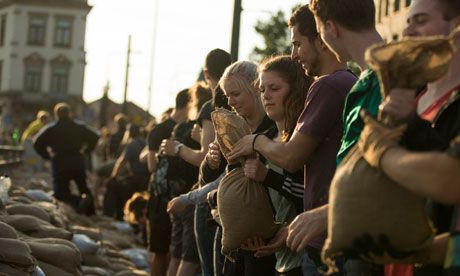 Volunteers in Dresden pass sandbags to build an embankment against the rising Elbe. Photograph: Thomas Peter/Reuters
Volunteers in Dresden pass sandbags to build an embankment against the rising Elbe. Photograph: Thomas Peter/Reuters
In Dresden and elsewhere the waters are rising. But among the sandbags, a powerful sense of solidarity is developing.
Watching from the Loschwitzer bridge as the brown, swirling waters rushed beneath her, Christa Pohl was overcome with a sense of deja vu.
"When Dresden flooded 11 years ago, they called it the flood of the century, saying the last time it had happened was 150 years before," she said. "The fact it has happened again, and so soon, fills me with a sense of foreboding."
The 73-year-old retired art archivist pointed past tree branches and coloured bits of debris being rapidly swept downstream, to the far side of the banks of the river Elbe and a bar and restaurant run by her friend. "They had only recently finished doing it up after the last flood. They didn't have any insurance because the premiums had become so high," she shrugged.
The picturesque establishment was now up to just below its roof in water. Of the white umbrellas in the beer garden, only the tips were visible.
Dresdeners gathered on the majestic iron bridge, known locally as the Blaue Wunder (blue wonder), to watch the waters surge through Germany's most famous baroque city – the latest victim in a spate of flooding in large parts of central Europe.
So far, the floods have claimed at least 16 lives, and wrecked the livelihoods of thousands more. In Germany alone, where large swaths of the country, from Bavaria to Saxony, are underwater after two weeks of solid rain, an estimated 50,000 people have been evacuated from their homes.
The southern city of Passau, on the river Danube, was breathing a sigh of relief on Wednesday as water levels there, which had never been higher since 1501, began to subside. Meanwhile, in cities such as Halle and Meissen the water was still rising steadily and residents watched helplessly as the it trickled through their makeshift dams.
Across the country, appeals were being made for volunteers to help in the flood effort. In Dresden, prisoners were among those roped into sewing and filling sandbags, while DIY stores were offering free shovels to rescue workers and urging other European countries to deliver more pumps and wellingtons after stocks in Germany ran dry.
The chancellor, Angela Merkel, on a tour of the region in a helicopter this week, pledged immediate help for every stricken family of up to €2,000 (£1,700).
"The positive thing to have come out of this is that everyone is banding together," said Klaus Horst, a 56-year-old civil servant, as he watched from Dresden's Brühlsche terrace, where jugglers and street musicians carried on delivering their entertain as usual to the crowds of tourists enjoying ice cream and beer in the summer sunshine while down below the murky waters swirled past. "The sense of solidarity is immense."
Around the historic city centre, sandbags were piled up – in front of the Semperoper opera house as well as museums, shops and banks. Many had been placed there in operations organised on social media websites, which brought thousands of helpers together.
Back at the bridge, a feverish team of the old and young – a punk next to a bespectacled student – were tying together sandbags, building up a thick wall of them at the Schillergarten restaurant. At Cafe Toscana on Schillerplatz, staff were ferrying plastic boxes of food from the kitchens to waiting vans to feed teams of workers operating throughout the city and beyond.
Thousands of soldiers have been drafted in across Germany to help, joined by around 500 French and Dutch troops in a sign of solidarity towards their neighbour, a move widely welcomed across the country.
Pohl volunteered her memories of another time Dresden will never forget, when she was five years old and the city was firebombed in the final months of the second world war.
"I can't help it," she said. "The sense of threat I felt then, with the city ablaze and people jumping into the Elbe to escape the heat and the flames, it comes back to me at times like this, when all you can do is look on helplessly."
 В Атырау -10
В Атырау -10